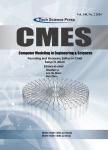Moving Least Squares Interpolation Based A-Posteriori Error Technique in Finite Element Elastic Analysis
作者机构:Civil Engineering DepartmentCollege of EngineeringKing Khalid UniversityAbha61421Saudi Arabia Ministry of InformationSoochna BhavanCGO ComplexDelhi110003India Urban Transport&Coastal Engineering DepartmentUniversity of Transport and CommunicationsHanoi100000Vietnam
出 版 物:《Computer Modeling in Engineering & Sciences》 (工程与科学中的计算机建模(英文))
年 卷 期:2021年第129卷第10期
页 面:167-189页
核心收录:
学科分类:07[理学] 0835[工学-软件工程] 0811[工学-控制科学与工程] 0701[理学-数学] 0812[工学-计算机科学与技术(可授工学、理学学位)] 070101[理学-基础数学]
主 题:Recovery points field variable derivatives effectivity error recovery support domain error convergence
摘 要:The performance of a-posteriori error methodology based on moving least squares(MLS)interpolation is explored in this paper by varying the finite element error recovery parameters,namely recovery points and field variable derivatives *** MLS interpolation based recovery technique uses the weighted least squares method on top of the finite element method’s field variable derivatives solution to build a continuous field variable derivatives *** boundary of the node support(mesh free patch of influenced nodes within a determined distance)is taken as circular,i.e.,circular support domain constructed using radial weights is *** field variable derivatives(stress and strains)are recovered at two kinds of points in the support domain,i.e.,Gauss points(super-convergent stress locations)and nodal *** errors are computed as the difference between the stress from the finite element results and projected stress from the post-processed energy norm at both elemental and global *** benchmark numerical tests using quadrilateral and triangular meshes measure the finite element errors in strain and stress *** numerical examples showed the support domain-based recovery technique’s capabilities for effective and efficient error estimation in the finite element analysis of elastic *** MLS interpolation based recovery technique performs better for stress extraction at Gauss points with the quadrilateral discretization of the problem *** is also shown that the behavior of the MLS interpolation based a-posteriori error technique in stress extraction is comparable to classical Zienkiewicz-Zhu(ZZ)a-posteriori error technique.



